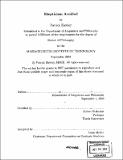| dc.contributor.advisor | Robert Stalnaker. | en_US |
| dc.contributor.author | Hawley, Patrick, 1964- | en_US |
| dc.contributor.other | Massachusetts Institute of Technology. Dept. of Linguistics and Philosophy. | en_US |
| dc.date.accessioned | 2009-01-23T16:42:12Z | |
| dc.date.available | 2009-01-23T16:42:12Z | |
| dc.date.copyright | 2003 | en_US |
| dc.date.issued | 2003 | en_US |
| dc.identifier.uri | http://dspace.mit.edu/handle/1721.1/17644 | en_US |
| dc.identifier.uri | http://hdl.handle.net/1721.1/17644 | |
| dc.description | Thesis (Ph. D.)--Massachusetts Institute of Technology, Dept. of Linguistics and Philosophy, 2003. | en_US |
| dc.description | Includes bibliographical references (leaves 121-126). | en_US |
| dc.description.abstract | I evaluate three replies to skepticism, drawing conclusions about the meaning of "justified", the viability of foundationalism, the value of knowledge, and the role of belief in rational action. In the first chapter, I examine the following skeptical argument: Something is justified only if justified by a justified thing; circular and infinite chains of justification are illegitimate; therefore, no belief is justified. A linguistic investigation reveals that this argument contains two ambiguities not yet noticed by epistemologists. The linguistic observations favor foundationalism about justification, showing how the foundationalist can maintain his view, while explaining away the force of the skeptical argument. However, in the second chapter, I argue that foundationalism is unsatisfactory, for non-skeptical reasons. If a foundationalist tries to explain how some things can be basic, then she must endorse a certain kind of circularity. But a foundationalist should not endorse this circularity. Dissecting a single skeptical argument is an interesting although limited endeavour. In the third chapter, I argue that an entire class of skeptical arguments can be avoided. Distinguishing rational action from rational belief change, I claim that certain changes in belief cannot occur during a rational act. In particular, I argue, some skeptical conclusions cannot be accepted while performing an ordinary rational act. The main conclusion of this chapter is: to avoid acting irrationally, it is rational to avoid certain skeptical arguments. Sometimes it is better to concede to skepticism than to flee. | en_US |
| dc.description.abstract | (cont.) In the fourth chapter, I argue that knowledge is no more valuable than stable true belief. This surprising claim supports the conclusion that skepticism about knowledge is harmless. Even if we cannot know anything about the external world-or even if we cannot know anything at all-we may have something just as valuable as knowledge: stable true beliefs. | en_US |
| dc.description.statementofresponsibility | by Patrick Hawley. | en_US |
| dc.format.extent | 126 leaves | en_US |
| dc.language.iso | eng | en_US |
| dc.publisher | Massachusetts Institute of Technology | en_US |
| dc.rights | M.I.T. theses are protected by
copyright. They may be viewed from this source for any purpose, but
reproduction or distribution in any format is prohibited without written
permission. See provided URL for inquiries about permission. | en_US |
| dc.rights.uri | http://dspace.mit.edu/handle/1721.1/17644 | en_US |
| dc.rights.uri | http://dspace.mit.edu/handle/1721.1/7582 | en_US |
| dc.subject | Linguistics and Philosophy. | en_US |
| dc.title | Skepticism avoided | en_US |
| dc.type | Thesis | en_US |
| dc.description.degree | Ph.D. | en_US |
| dc.contributor.department | Massachusetts Institute of Technology. Department of Linguistics and Philosophy | |
| dc.identifier.oclc | 54909143 | en_US |
